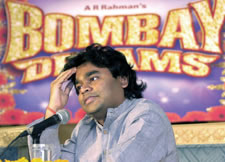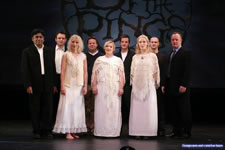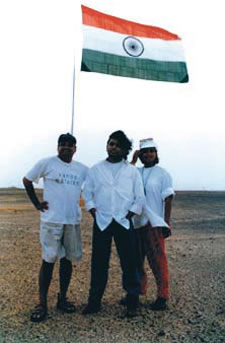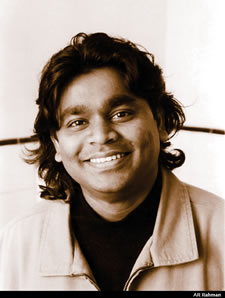Arts
Yaar Tujhe Salaam

A conversation with music legend A.R. Rahman.
 |
| There is an ethereal quality to A. R. Rahman that you can experience by just being around him. It’s not his music, it’s his person. The way he looks at you, the way he smiles, the way he expresses happiness. There is a genuineness about his personality that just draws you to him.
There is calmness, a sort of unexplainable peace that fills the heart when you hear him speak. When you talk to him, he listens with undivided attention. And when he makes music, time stops still. All that you are surrounded by is the melody. All the notes are perfectly arranged, the tempo is just right, and suddenly everything seems to be perfect in this whole wide crazy world. From Roja to Rang De Basanti and from Bombay Dreams to Lord of the Rings musical, Rahman is busy painting the world music scene with a kaleidoscope of his inimitable musical colors that have forever changed and enriched the international music scene. Trained in Western classical music at the Trinity College of Music in Britain, the “Mozart of Madras,” as he is affectionately known, has composed music for nearly 100 films in Hindi, Tamil and Telugu. He also composed the music for the Lord of the Rings musical, based on the acclaimed, sci-fi bestseller and movie. He is also the recipient of the Padmashri award. At a retrospective of his works at Stanford University, Rahman strode into the Braun Music Center rehearsal hall to pin drop silence. He casually smiles at the student organizers for the evening’s function, glances at his watch and apologizes: “Sorry I am late. I had to make an unplanned stop at Wal-Mart,” drawing peals of laughter. The ice is broken. Dressed in casual white trousers and a shirt, he is sporting a crew cut hairstyle, a far cry from his trademark curly locks from “Ma Tujhe Salaam.” “It didn’t suit me!” he says laughing at his own joke. As everyone scurries around to make him feel comfortable, Rahman announces, “How about having some food while we talk?” Everybody responds enthusiastically and over steaming hot idlis, lemon rice, and besan halwa, the man of the moment talks about his music, his life, and his future. In an exclusive interview with Little India, A.R. Rahman shares snippets about the most precious part of his life — his music and how he creates magic that transcends geographical barriers and touches the deep core of a listener’s heart.
It is more spontaneous, I would say. At the same time, my style is not completely intuitive. I believe in testing my music thoroughly before I share it with the world. Sometimes notes just come to my mind and I compose something. After hearing it two-three times, I suddenly start disliking the piece (smiles). The same cluster of notes that sounded so melodious and catchy just two-three days back now start sounding routine and mundane. It is surprising, but this has happened several times with me. Sometimes, I just discard the entire notation; sometimes I decide to give it a little bit of twist here and there to create something better and then there are times when I have to really do a big overhaul to give the notations a different look. I just go by my instincts when I am doing this “repair work.” Many times, I just blank my mind, pray and play around with a few notes to come up with a composition. Also, as I always say, music is a spiritual thing not a formula. Is there a particular raga that you keep going back to when you are composing? Is there a favorite for you? Raag Des? (laughs). Everyone says I keep composing in Des. Yes there are some rags that I like a lot and sometimes I keep going towards them and I have to stop myself from going there while composing every tune. In Lord of the Rings musical, you are going to hear a lot of Indian classical music getting blended into some interesting western music, it is going to be a concoction that many will love. Imagine the characters of Lord of the Rings and then imagine the notes of raag darbari and raag yaman kalyan intermingling in the background! (smiles slyly).
What about your ‘famous’ working hours? Is it true that you work the whole night and sleep in the mornings? Yes, it is true (laughs loudly). My music making schedule starts at around 6 p.m. or 7 p.m. and then goes on till 6 a.m. It is so quiet at night and the earlier hours of dawn, I just love it. Lataji was really surprised when she came to know my schedule, so for her one time I recorded in the morning (Smiles shyly). Another thing is that I only work in my studio in Chennai. It is not a very big place but it is equipped with everything that I need to create what I do.
It’s been a while since you have gone international. How did it happen?
Actually to tell you the truth, I was really scared to compose in any other language than Tamil when I first started out. Back then, composing for a Hindi movie was a big step for me. And now, I feel composing in English is a lot of fun and I find it easy as compared to composing for any other language! Music should have no bounds. As a music director sometimes I am amazed by how well the music I make fits into a language that I don’t even know! I can still convey the emotions through my music. That is the beauty in music. There are no language or religious barriers in music!
Are you a very religious person? Yes. I believe that my highest musical inspiration comes from Allah. I was here two days back listening to Farid Ayaz and his qawwali ensemble perform at this festival. I just closed my eyes and listened and was completely lost in their compositions.
It is believed that creative people need stimulants to create great music. Any comments?
A.R. Rehman is a phenomenon not only in the Indian film industry, but also in the world music scene. How does it feel to be so popular? Does this popularity come with more responsibility and expectations from everyone to outdo oneself every time? Scarry? (laughs). Expectations are there. But, I am a human being too. Even I have good and bad days. When I am composing, I just shut myself out from everything. It is just me and my music and the various sounds and beats that influence and inspire me. At this time, I don’t think about expectations or timelines. I just take my time to feel every note and compose. By the grace of my God, I compose music that everyone likes and accepts.
You have been often criticized in the media for only using very feminine and shrill voices and never experimenting with husky ones as far as women singers go. What kind of voices do you like? Who are some of your favorite singers? Yes, I do go for softer voices. I like delicate and soft voices, but most importantly, I like voices that have their own distinct personality. I don’t want voices that sound like Ashaji’s or Lataji’s voices! Also for all songs I have different voice requirements and that is why so many singers have sung for me. I also am very open to hearing new voices. I will be sinning if I don’t provide an opportunity to talented people. Sometimes, I hear a voice and instantly know where it will fit. For example when I composed “Luki Chupi” for Rang de Basanti, I knew from the beginning that it was a song made for Lataji’s voice. Favorite singers? I don’t want to say someone’s name and then just upset the others! But I really like voices of Hariharan and of course Ashaji and Lataji’s voices.
According to you, what is the single most compelling factor in your music? I think it is the right combination of melody and tempo. To achieve this balance is very tricky. Sometimes you fall in love with some notes so much that you ignore the importance of the beats that is going to make those notes sound even more melodious. I feel that in my songs I am able to achieve a balance between the melody and the tempo so even though “Chaiyya Chaiyaa” is foot-tapping, it is extremely melodious too.
Does music have the power to bring peace? Music is very powerful but since it does not use any physical force to get its message across, it is not considered as an influential tool. Yes, I believe music has power to bring peace, both within oneself and also among people.
What is a typical day in the life of A.R. Rahman? It’s very boring you don’t want to know (laughs loudly). The typical day in the life of A.R.Rahman doesn’t include any socializing, interviewing or partying. I am a very solitary person and prefer to spend my time in my studio surrounded by my music systems, my instruments and my musical gadgets.
Sometimes when I am listening to a song, I don’t know the composer but yet I can say it is a composition by Rahman. What is this intangible something that makes the song your song? I think it is personality. Just like every person talks differently, walks differently, my compositions hreflect my personality and maybe my listeners know it and catch my tune.
What do you do when you are not composing music? I like spending time alone with my family. It is a very peaceful feeling. My wife and three kids also travel with me whenever possible. Apart from that, when I am not composing music, I don’t feel alright. I just feel an urge to get to my studio and start composing. I keep thinking about some tune that I heard somewhere and keep humming it. In Indian cinema, whose music are you most influenced by? I love hearing R.D.Burman and Naushad compositions. These days I am also discovering a new love for Madan Mohan compositions. I am also learning Hindustani classical music from Ustad Ghulam Mustafa Khan.
What would you be doing if you were not composing music? I would have been a car chauffeur probably!
As the variegated clips from Roja, Minsara Kanavu (Tamil), Rangeela, Bombay, Lagaan, Gentleman, Yuva, Saathiya, Tehzeeb, Meenaxi, Swades, Bombay Dreams, Warriors of Heaven and Earth, and Rang De Basanti appear on the screen, the audience cheers. What is most attractive about Rahman’s music is his ability to link modern rhythms with Indian classical and folk music. Rahman borrows equally beautifully from rap, disco, folk, reggae, Jazz, Qawaali, Hindustani and Carnatic music. Rahman plays a variety of instruments too. Remember the utterly unforgettable harmonium number between the vocals in “Kehna hi Kya”? Rahman’s magic fingers are at work there. As the program draws to an end, Rahman announces, “I almost forgot, someone asked me to sing here!” To loud cheers he sings “Dil Se.” As I rush over to him for one last question, he smiles broadly and with his eyes twinkling says, “Ask me two!” In that moment, he is not only the Mozart of Madras, the Isai Arasan (Emperor of Music) and the Isai Puyal (Musical Storm); he is also a person blessed with a heart of gold. |

 . Is your style of composing more methodical or is it more spontaneous? By methodical, I mean do you follow a similar pattern while composing music or do you just let your mind free and it just comes to you in a sudden moment?
. Is your style of composing more methodical or is it more spontaneous? By methodical, I mean do you follow a similar pattern while composing music or do you just let your mind free and it just comes to you in a sudden moment? Andrew Lloyd Webber, who is a very well known composer of musicals, hired me to compose his maiden stage production Bombay Dreams. It cost about $7 million and was one of the more expensive Broadway productions then. Before, I also worked on the theme song for the Indian version of the Chinese/English costume drama Warriors of Heaven and Earth with the background of the ancient Silk Route. I used Chinese, Turkish and Indian musical instruments. We got the music recorded in Prague. I composed this soundtrack in just three days!
Andrew Lloyd Webber, who is a very well known composer of musicals, hired me to compose his maiden stage production Bombay Dreams. It cost about $7 million and was one of the more expensive Broadway productions then. Before, I also worked on the theme song for the Indian version of the Chinese/English costume drama Warriors of Heaven and Earth with the background of the ancient Silk Route. I used Chinese, Turkish and Indian musical instruments. We got the music recorded in Prague. I composed this soundtrack in just three days!  I always thought that every creative person in the music world had to drink or take dope to be a good artist or composer. But then I heard Ilayaraja. He was making such beautiful music and leading a pure life. I was under the impression that if it’s music, whoever it is, they must have some bad habit. I always thought they have to drink, smoke and have cocaine to get their inspiration. The man who changed these impressions altogether was Ilayaraja. He proved that he can make good music without any bad habits. Even now he is an inspiration for me being so religious today and with the grace of God, I don’t need to drink or smoke to make my music.
I always thought that every creative person in the music world had to drink or take dope to be a good artist or composer. But then I heard Ilayaraja. He was making such beautiful music and leading a pure life. I was under the impression that if it’s music, whoever it is, they must have some bad habit. I always thought they have to drink, smoke and have cocaine to get their inspiration. The man who changed these impressions altogether was Ilayaraja. He proved that he can make good music without any bad habits. Even now he is an inspiration for me being so religious today and with the grace of God, I don’t need to drink or smoke to make my music.  As Rahman stepped into the Dinkelspiel Auditorium for the felicitation function of the evening, the 300 plus strong bay area crowd cheered. Amidst loud cries of “We love you Rahman” and shrill whistles, a visual presentation traced the history of Indian film music before 25-year-old energetic Rahman burst onto the scene in 1991 with Roja.
As Rahman stepped into the Dinkelspiel Auditorium for the felicitation function of the evening, the 300 plus strong bay area crowd cheered. Amidst loud cries of “We love you Rahman” and shrill whistles, a visual presentation traced the history of Indian film music before 25-year-old energetic Rahman burst onto the scene in 1991 with Roja.